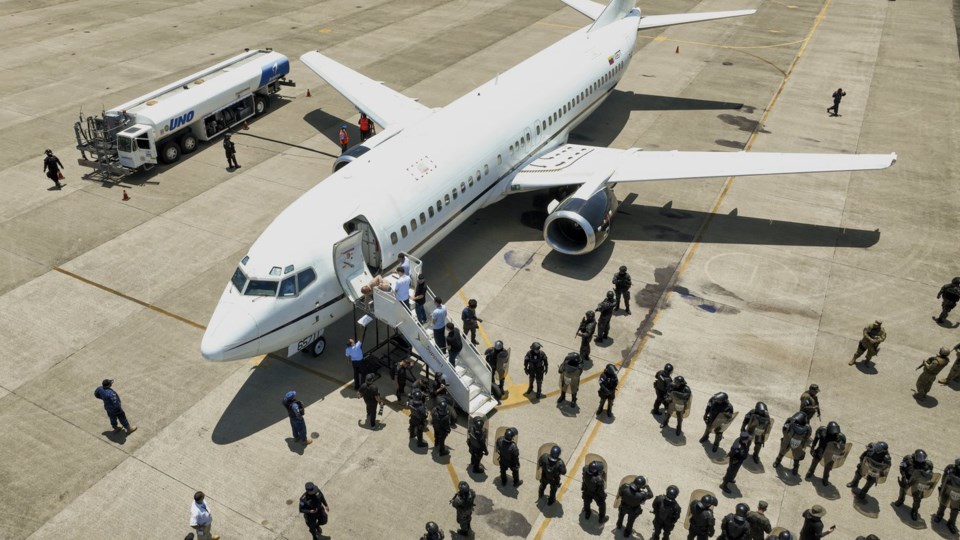CARACAS, Venezuela (AP) — Venezuela released 10 jailed Americans on Friday in exchange for getting home scores of migrants deported by the United States to El Salvador months ago under the Trump administration's immigration crackdown, officials said.
The arrangement represents a diplomatic achievement for Venezuelan President Nicolás Maduro, helps President Donald Trump in his goal of bringing home Americans jailed abroad and lands El Salvador a swap that its president had proposed months ago.
“Every wrongfully detained American in Venezuela is now free and back in our homeland,” Secretary of State Marco Rubio said in a statement in which he thanked El Salvadoran President Nayib Bukele.
Bukele said his country had handed over all the Venezuelan nationals in its custody. The Venezuelan government said it had paid a “steep price” by having to release the U.S. nationals but was pleased to have its own jailed citizens back.
Central to the deal are the more than 250 Venezuelan migrants being freed by El Salvador, which in March agreed to a $6 million payment from the Trump administration to house them in a notorious Salvadoran prison.
The arrangement drew immediate blowback when Trump invoked an 18th century wartime law, the Alien Enemies Act, to quickly remove men his administration had accused of belonging to the violent Tren de Aragua street gang. The administration did not provide evidence to back those claims.
The Venezuelans have been held in a mega-prison known as the Terrorism Confinement Center, or CECOT, which was built to hold alleged gang members in Bukele’s war on the country’s gangs. Human rights groups have documented hundreds of deaths and cases of torture inside its walls.
Among the Americans freed Friday was 37-year-old Lucas Hunter, whose family says he was kidnapped in January by Venezuelan border guards from inside Colombia, where he was vacationing.
“We cannot wait to see him in person and help him recover from the ordeal,” said his younger sister Sophie Hunter.
The release of the Venezuelans is an invaluable win for Maduro as he presses his efforts to assert himself as president despite credible evidence that he lost reelection last year. Long on the receiving end of accusations of human rights abuses, Maduro for months used the men’s detention in El Salvador to flip the script on the U.S. government, forcing even some of his strongest political opponents to agree with his condemnation of the migrants’ treatment.
The migrants' return will allow Maduro to reaffirm support within his shrinking base, while it demonstrates that even if the Trump administration and other nations see him as an illegitimate president, he is still firmly in power.
The release comes just a week after the State Department reiterated its policy of shunning Maduro government officials and recognizing only the National Assembly elected in 2015 as the legitimate government of the country. Signed by Rubio, the cable said U.S. officials are free to meet and have discussions with National Assembly members “but cannot engage with Maduro regime representatives unless cleared by the Department of State.”
Venezuelan authorities detained nearly a dozen U.S. citizens in the second half of 2024 and linked them to alleged plots to destabilize the country.
"We have prayed for this day for almost a year. My brother is an innocent man who was used as a political pawn by the Maduro regime, said a statement from Christian Casteneda, whose brother Wilbert, a Navy SEAL, was arrested in his Caracas hotel room last year.
Global Reach, a nonprofit organization that had advocated for his release and that of several other Americans, said Venezuelan officials initially and falsely accused him of being involved in a coup but backed off that claim.
The Americans were among dozens of people, including activists, opposition members and union leaders, that Venezuela’s government took into custody in its brutal campaign to crack down on dissent in the 11 months since Maduro claimed to win reelection.
The U.S. government, along with several other Western nations, does not recognize Maduro’s claim to victory and instead points to tally sheets collected by the opposition coalition showing that its candidate, Edmundo González, won the July 2024 election by a more than a two-to-one margin.
The dispute over results prompted immediate protests, and the government responded by detaining more than 2,000 people, mostly poor young men. González fled into exile in Spain to avoid arrest.
Despite the U.S. not recognizing Maduro, the two governments have carried out other recent exchanges.
In May, Venezuela freed a U.S. Air Force veteran after about six months in detention. Scott St. Clair's family has said the language specialist, who served four tours in Afghanistan, had traveled to South America to seek treatment for post-traumatic stress disorder.
St. Clair was handed over to Richard Grenell, Trump’s envoy for special missions, during a meeting on a Caribbean island.
Three months earlier, six other Americans whom the U.S. government considered wrongfully detained in Venezuela were released after Grenell met with Maduro at the presidential palace.
Grenell, during the meeting in Venezuela’s capital, Caracas, urged Maduro to take back deported migrants who have committed crimes in the U.S. Hundreds of Venezuelans have since been deported to their home country, but more than 200 deported from the U.S. have been held since mid-March at the prison in El Salvador.
Lawyers have little access to those in the prison, which is heavily guarded, and information has been locked tight, other than heavily produced state propaganda videos showing tattooed men packed behind bars.
As a result, prominent human rights groups and lawyers working with the Venezuelans on legal cases had little information of their movement until they boarded the plane.
___
Tucker reported from Washington and Janetsky from Mexico City. Associated Press writers Matt Lee and Seung Min Kim in Washington contributed to this report.
Regina Garcia Cano, Eric Tucker And Megan Janetsky, The Associated Press



